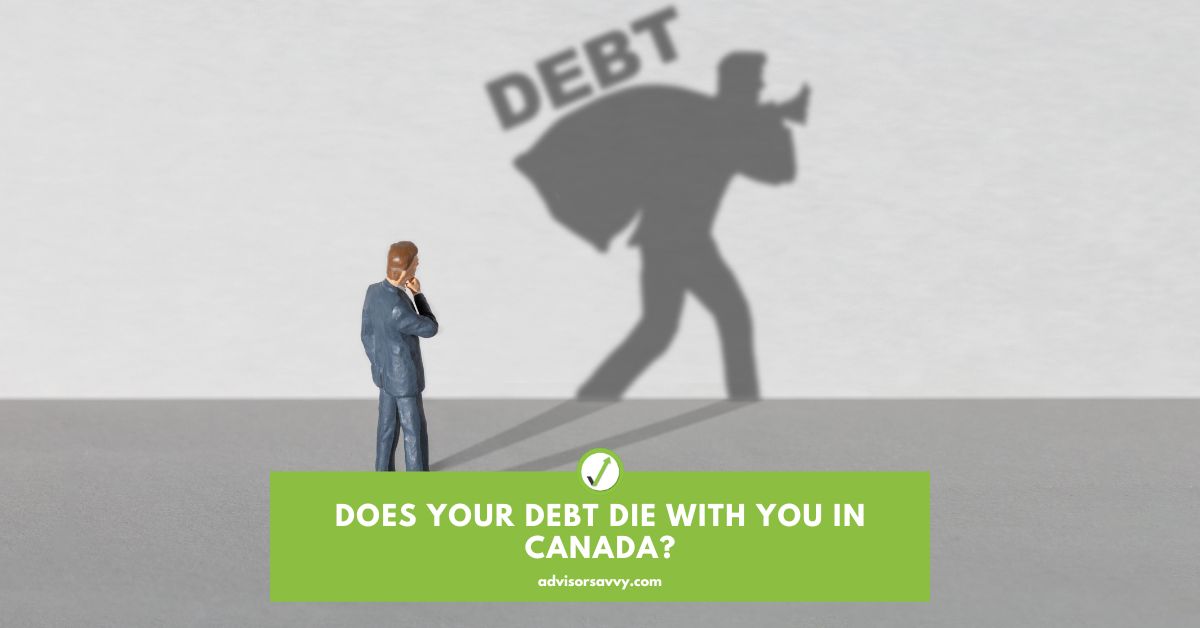
You might create a will to ensure your estate is well-managed and dispersed after you die. But what happens to your debt? Does your debt die with you in Canada? Or will your family receive a large mortgage bill or collection calls along with their childhood home? Hopefully, you have enough money in your savings, assets, and estate to take care of your debt. However, Canada’s laws have a few paths for debt after death depending on who it belongs to and how long it’s been since you’ve had it.

Table of contents
Are you worried about debt after death? The first step is awareness. Don’t worry — your inheritors won’t have to manage your debt if you’re vigilant in your estate planning and repayments. With this guide, we’ll help you learn the ins and outs of debt upon death in Canada.
How long until debt is written off in Canada?
After browsing the odd news clipping or blog article, you might say, 6 years. But there’s an important distinction: that’s how long it takes for old debt records to drop from your credit report and alleviate your credit score. You might have also mistaken six years for the statute of limitations on debt, the period a creditor has to take you to court over debt. Although, that statute of limitations varies from province to province.
All of the above is true, but none of these regulations refer to how long it takes until debt is written off. In other words, how long does it take for debt to be completely forgiven? Unfortunately, debt is never written off in Canada, based solely on a time period. The only way to have debt written off is to declare bankruptcy. With that said, sometimes creditors may write off your debt if they deem it uncollectible, but there are no actual laws that require this. In addition, there is no guarantee that old debt can’t haunt you in the future.
Related Reading: How is your credit score calculated in Canada?
Tax debt
The CRA has its own statutes of limitations for tax debt known as the CLP (collections limitation period). Unlike ordinary creditors, the Canada Revenue Agency has superior powers. But similar to other debts, the debt isn’t “written off” once that period lapses. Here’s more details:
- Six years for business payroll debt upon sent date for notice of assessment
- Ten years for business GST/HST debt, individual tax, corporation tax, and large corporation tax from the date or 91 days after a notice of assessment are sent.
But the CRA can take specific actions to restart the CLP if they want to claim old tax debt, including:
- Garnish your wages with your employer
- Issue notice of assessment to third parties to claim your debt
- Certify your debt with the Federal Court of Canada
- Seize your assets
Similarly, you as the taxpayer might restart the CLP by:
- Making a payment (voluntary)
- Proposing a payment plan or security payment with the CRA
- Requesting reassessment
- Filing a notice of objection or an appeal
- Requesting pre-authorized debt payments
This means that the 6-year or 10-year CLP can take many more years to run its course. So don’t get too excited — your CRA taxes won’t go away if you simply don’t pay them or avoid correspondence.
Once you die, you can’t complete or partake in any of the actions above. However, the CRA can still seize your estate’s assets and issue notices of assessment to third parties. As a general rule of thumb, the CRA is the one creditor you shouldn’t miss payments with.
Now, what if the CLP manages to run out? The CRA cannot try to collect the debt anymore, though you can still make voluntary payments.
Related Reading: How Estate and Inheritance Taxes Work in Canada
What happens to unpaid debt in Canada?
Fortunately, debt is not passed onto others when someone dies in Canada. In other words, your beneficiaries will not be responsible for paying your debts beyond death. However, it’s a good idea to outline a plan of how outstanding debts will be handled in your will. Just because debt isn’t passed onto others, that doesn’t mean it won’t go away. In most cases, outstanding debts are paid from the estate.
But what if the estate doesn’t have enough to pay the debt? In this circumstance, it’s safe to say the debt dies with the individual. After all, if there is no money to pay it and no one to chase, there’s not much a creditor can do to collect the debts.
Although, creditors will continue seeking debt repayment in Canada even after you die. They may reach out to family and friends in an attempt to collect debts. Be sure to know your rights and responsibilities before paying under these circumstances. If there is not enough money in the deceased’s estate to pay the debt, it’s safe to say you’re not responsible as a surviving family member or friend.
Do unpaid debts ever disappear in Canada?
Sort of. Equifax and TransUnion removes unpaid debts from your credit report after six years, though that won’t mean much once you’re already gone. However, the debt remains, and a creditor might seek repayment from your estate before you can disperse inheritances.
As for tax debt, this one’s tricky. The CLP is rarely complete without the CRA getting its piece of the pie. But your debt still exists if it lapses — they just can’t collect it.
Related Reading: Canada Debt: How much is too much?
Does Your Debt Die with You in Canada?
Most of the time? No. Your estate is still responsible for your debts, even if you’ve planned to give out inheritances. There are minimal circumstances in which your debt dies with you, such as:
- If your estate doesn’t have sufficient funds to repay the debt
- The CLP has run out (when CRA is the creditor)
If none of the above apply, creditors will seek to collect the debt from your estate. Even if you have children without inheritances, creditors cannot legally pursue them for the debts. They may try, but family members and friends are not responsible for your debt when you die.
Can you inherit debt from parents in Canada?
Yes and no. You don’t inherit debts from your parents in Canada if your parents are the sole borrowers on the loan. However, you are responsible for any debt you co-signed, just as you would be if they were still alive.
Now, what if you didn’t co-sign any loans and your parents still had debt? In this case, the creditors would pursue your parents’ estate for the outstanding debt before you receive your inheritance. In a way, you pay for the debt because your inheritance would be less. However, you do not directly inherit debt from parents. If their estate cannot cover the cost of the debt, it does not become your obligation.
Are you responsible for your spouse’s debt in Canada?
The same answer applies as we saw above. You’re only responsible for your spouse’s debt in Canada if you co-signed one of their loans or acted as a guarantor. For example, a creditor might seek repayment from you if you’re on the title for a shared property or if you shared a credit card with your deceased spouse. Otherwise? You’re in the clear. This also means your credit report and score will remain unscathed by a spouse with immense debt.
What happens to my debt if I have a will?
If you have a will, your creditors, including the CRA, will seek debt repayment from your estate. If your estate doesn’t have enough money to repay the debts without your planned inheritances, the debt will be taken from your planned inheritances. Only after the debt repayment will your children and any other recipients receive their inheritance.
It’s paramount to write a will and choose a power of attorney well before your anticipated passing. We’re talking 40s and 50s, not 70s or 80s. Why? Because you should decide where your money goes, not the government, who will take responsibility for your estate upon your death.
Related Reading: Estate Planning Checklist For Canadians
How to prepare for debt after death
Even if your children aren’t responsible for your debt upon your death, you still want to leave them with the inheritance you planned. That’s why it’s vital to plan for debt after death with these tips:
- Pass down assets sooner: You might consider passing down your wealth before you die. This poses a few benefits, like reducing your estate’s value to avoid probate and limiting the amount debt collectors and creditors can take from it. Additionally, it supports your children while they’re in the thick of creating a life for themselves versus when they don’t really need the help later on.
- Plan early: You can create a will as young as age 18. So, why wait until you’re 50 to start thinking about one? This sentiment rings especially true for anyone with a risky career, like military personnel or laborers. In addition, a will should be considered for anyone with wealth to protect, regardless of age. Start estate planning, create a will, and talk to your family about plans after death well before you think you’ll need to execute a will.
- Discourage or address cosigned debt: If your spouse or children are on the title for your home or other debts, ensure they’re off the title before you die. This way, they won’t be liable for paying back the debt once you’re gone.
- Consider life insurance: Certain life insurance policies can cover your inheritors’ debt obligations upon your death.
- Know your rights: Debt collectors will try every tactic in the book to collect a debt — even if it means misleading your family. So make sure you and your loved ones are up to speed on your rights when it comes to debt collections. You might start with the Collections and Debt Settlement Services Act.
Debt & Death: Key Takeaways
A death in the family is a stressful enough experience — debt might make things even worse, but it doesn’t have to. So, does debt die with you in Canada? Rest assured, your inheritors aren’t responsible for your debts unless they cosign or guarantee your loans.
However, your debts do have the power to diminish your children’s inheritances. For example, say you planned to pass down two properties but owed the CRA $250,000. The CRA will go after your estate, and the executor of your estate might be forced to sell a property to repay the debt.
Fortunately, debt after death can be an easy experience to navigate with appropriate financial planning and a well thought out will.
Read More: Estate Taxes in Canada

